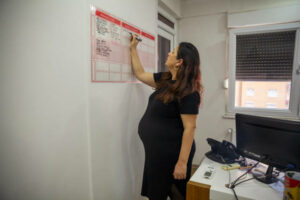
Workplace pregnancy or maternity leave 3 tragic cases
Popular beauty brand sued for maternity leave dismissal
In February 2024, an employee dismissed while on maternity leave by beauty giant Mecca Cosmetica launched a lawsuit against the company. She alleged that Mecca had used her maternity leave as a test to determine if her role should be made redundant.
Alethea Larkin, who served as Mecca Cosmetica’s head of brand marketing, claimed that the company failed to consult her properly about her redundancy. She said she was given less than a day’s notice and that prior to her maternity leave, she had been forced to work unreasonable hours.
Ms Larkin alleged that Mecca Cosmetica refused to organise “keep in touch” days that she had requested to discuss her return to work. And that instead, she was invited to a meeting to discuss “marketing team structure changes.” Ms Larkin claimed that she was told in this meeting that her maternity leave was used as a test. Namely, to work out if her position could be amalgamated into another role. In early March 2024, Mecca Cosmetica decided to agree to a “pragmatic” settlement with Ms Larkin.

Pregnancy discrimination “widespread” in Australia
Unfortunately, cases of pregnancy-related discrimination like Ms Larkin’s are not isolated incidents. A survey by the Australian Human Rights Commission revealed that one in two mothers (49 per cent) said they suffered discrimination in the workplace. That is, during their pregnancy, while on maternity leave or on their return to work.
More than a third of mothers (35 per cent) said they suffered discrimination on returning to work after maternity leave. While 34 per cent suffered discrimination due to their increased caring responsibilities.
Almost a third (32 per cent) of mothers revealed they were adversely treated when they requested or went on maternity leave. And a quarter (27 per cent) said they suffered discrimination during their pregnancy. A further 8 per cent said they were discriminated against for breast-feeding or expressing milk. The Australian Human Rights Commission stated that pregnancy-related “discrimination continues to be widespread” in Australia.

Dismissal among many forms of discrimination
The Australian Human Rights Commission said that discrimination can range from “from negative attitudes through to dismissal.” Its survey revealed that one in five (18 per cent) of mothers were fired, made redundant, had their role restructured or did not have their contract renewed. This was either during their pregnancy, when they sought or took maternity leave or on their return to work. The survey also revealed that more than a third (37 per cent) said they were threatened with the same.
Half (49 per cent) of mothers said their discrimination was related to pay or the conditions and duties of their job, while 46 per cent said they faced discrimination with regard to career advancement opportunities and performance assessments. 40 per cent said they faced negative attitudes or comments from their boss or coworkers, while 48 per cent said they suffered discrimination related to their health and safety.
Melbourne worker fired for revealing pregnancy during probation
In February 2024, a pregnant Melbourne woman took to TikTok to share her story of being dismissed via text. The woman, Amy, worked in a corporate position full time and was still in her probation period. She took sick leave, telling her employer that she had experienced “pregnancy-related illness” and said she had a medical certificate.
However, at 7.47am the very next day, Amy was sitting in her car ready to head to work when she received a text. It was from her boss, telling her she had been fired. The reason provided was that she had taken “excessive sick leave” while on probation

“Put your hand up if you were fired this morning at 7.47am via text – by a corporate job mind you – and you had emailed them yesterday saying that you are pregnant, suffering from pregnancy-related illness, and had a medical certificate, and happy to get a letter from [my] doctor stating that days off were because of your medical-related illness because of pregnancy” Amy said in her TikTok video. “Yeah, that really happened to me.”
“You’ve texted me at 7.47am when my shift starts at 9am with no prior talking to about performance or anything like that. Just terminated via text.” Among the many comments on Amy’s TikTok video were those advising her to take her employer to the FWC. “Definitely follow up with Fair Work, so sorry you have to deal with this while you’re unwell and preparing for a baby,” one commenter said. “Go to fair work. I had this happen during my pregnancy last year and I won my court case,” another said.

Employer forced to pay $235K for making pregnant worker redundant
The adverse action case Sagona v R&C Piccoli Investments PTY LTD [2014] involved Samantha Sagona, who had worked for her employer for over a decade. Prior to her redundancy, she had a discussion with the owners of the business about being entitled to a share of its profits. This was because the owners, who were husband and wife, were due to soon retire at the end of 2012.
But in August 2012, Ms Sagona told the owners that she was pregnant and that she would be taking maternity leave. It was after this announcement that she claims the business’s owners subjected her to inappropriate treatment. Two days later, they set a meeting in which they told her about their concerns regarding her pregnancy. Namely, that it would affect the business and their decision to retire.
The owners also suggested that Ms Sagona may not be able to share in the profits following their retirement. And that once she had her baby, she would not be as dedicated to her work.

Worker told pregnancy was ‘not a good look’
The discrimination Ms Sagona faced due to her pregnancy did not end there, however. The owners also told her that at 12 weeks into her pregnancy she would need to tell them how long she would be taking maternity leave for. They said that she could remain in her position until the end of the year. That then she would have to take her long service leave. This was because the owners thought it would be too hot for her to work in January and February due to her pregnancy.
But perhaps the most offensive demand of the owners was that when she returned from leave, Ms Sagona would have to work in a “behind the scenes capacity.” This was because they thought the sight of her being pregnant to customers “was not a good look.”
Ms Sagona was forced to work up to 50 hours a week during her pregnancy, or as the owners said: “whatever hours it takes’ to make her sales targets.” They told her that when she returned from maternity leave, she could only work full-time. The owners also increased her sales targets to unreasonable levels. And when she did not meet them, they threatened to close down the business.

Pregnant worker is forced to resign
Given all the discrimination she faced, Ms Sagona sought legal advice. She soon sent the business’s owners a letter in which she said she “loved her job and wished to continue working with the [business]. However felt that they had treated her badly since she advised them of her pregnancy.”
This did not sit well with the owners. And with tensions between them and Ms Sagona mounting, a week later on 20 September 2012 she handed them her resignation letter. In the letter, Ms Sagona stated that “she had no alternative than to immediately resign from her employment.”
“No contrition”: Employer slammed by Federal Court
Ms Sagona’s adverse action case made it to the Federal Circuit Court of Australia, which found in her favour. It was accepted that she had been constructively dismissed (or forced to resign) due to her pregnancy. It was also found that Ms Sagona had experienced abuse for refusing to work additional hours and due to her letter complaining of discrimination.
The court decided to throw the book at the employer. The business was forced to pay Ms Sagona $164,097 for her unlawful termination. And $10,000 for the hurt and humiliation she suffered. But the punishment did not end there.

Employer forced to pay civil penalties
In addition to compensation, the court ordered the employer to pay Ms Sagona civil penalties. In deciding whether these should be enforced, the court considered that the business’s owners “have shown no contrition with respect to their actions.”
It was found that the owners “continued to insist that the victim of the conduct was in fact the perpetrator and that they were ‘set up’ by her.” And that the owners had shown “a remarkable lack of insight into their own behaviour and its impact on [Ms Sagona].”
The court decided to make an example of the employer to discourage other businesses from acting similarly. The judge regarded Ms Sagona’s case as “serious.” Firstly, because she was asked to work “all hours necessary” during her pregnancy. This was seen as an “unreasonable demand” that “employers should be discouraged to make.”
Secondly, the court outlined that the ability for mothers to continue in their employment during their pregnancy, and to continue their career after having a child “are matters which as a society we consider should be protected.” Given these imperatives, the court ordered the employer to pay $45,000 for its contraventions. While its owners were ordered to personally pay $8,000 each. These fines were all to be paid directly to Ms Sagona.

Worker wins $52K after dismissal while on maternity leave
The adverse action case Heraud v Roy Morgan Research LTD [2016] involved Jaye Heraud, who had started working for Roy Morgan Research in September 2012. About a year into her employment at the company, she went on maternity leave for an estimated period of 24 weeks.
While Ms Heraud was on maternity leave, Roy Morgan had lost a number of clients due to the arrival of a competing company. In late 2013 and early 2014, it began restructuring the business to make a number of redundancies. Ms Heraud was due to return to work on 2 July 2014, but just under a month before that date, she was informed that her role had been made redundant.
The company told Ms Heraud that it would not be “sensible” for her to take up her pre-maternity leave position for a short period. It said that it was more appropriate for the person who had filled her position while she was on leave to continue in the role. Roy Morgan offered to redeploy Ms Heraud to another role within the company. However, it soon retracted the offer after she requested a flexible working arrangement. It then made her redundant.

Federal Court finds employer at fault
Ms Heraud made an adverse action claim via the Fair Work Commission, and it was eventually heard by the Federal Circuit Court of Australia. The court accepted that Roy Morgan had breached the general protections provisions of the Fair Work Act 2009. Namely, for not permitting her to return to her role because she had exercised her workplace right to maternity leave.
The court also found that Roy Morgan had taken adverse action by not redeploying Ms Heraud because she had requested a flexible working arrangement. And for dismissing her for the same reason. Roy Morgan was ordered to pay her $52,000 in compensation for committing adverse action against her.
Conclusion to Dismissed for pregnancy or maternity leave
Our team at A Whole New Approach have over two decades of experience helping Australian workers fight for their rights. We can help you take action via the Fair Work Commission if you have faced unfair dismissal. Or a sham redundancy or a forced resignation. Or if you have experience discrimination, sexual harassment, or any violation of your workplace rights.
If you want to take action, it is critical that you act fast. The FWC only allows you to make an unfair dismissal claim within 21 days from the data of your dismissal. Get in touch with us today and we can help guide you through the process of making a claim.
Call us on 1800 333 666 for a free and confidential consultation.






